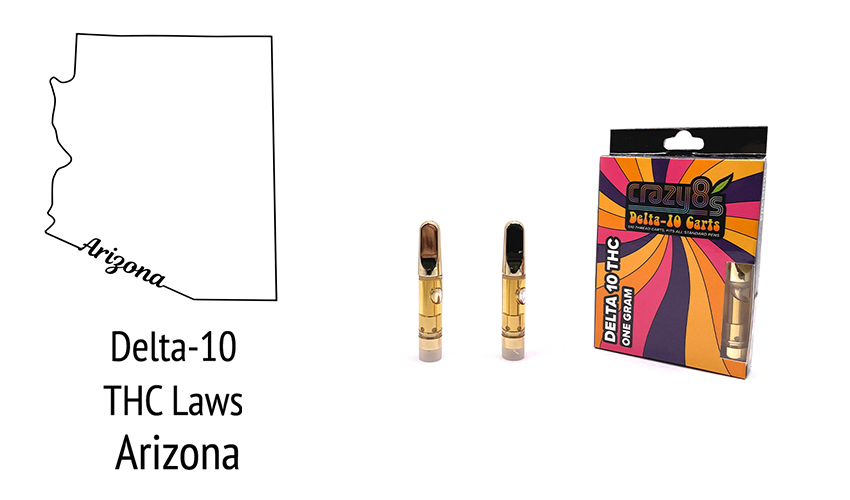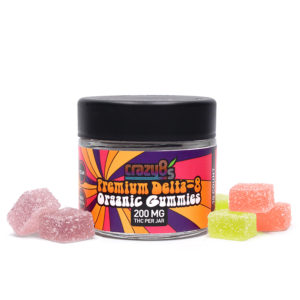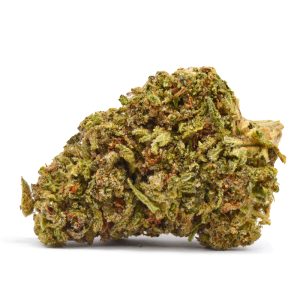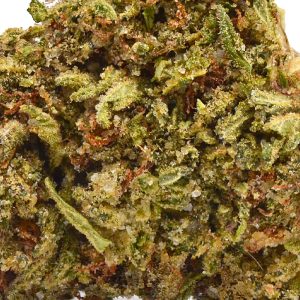Arizona recently legalized recreational cannabis, which complicated the legal status of hemp-derived tetrahydrocannabinols even more.
If you live in Arizona and want to try the rising star on the market, Delta-10 THC, you probably have questions about its legality. Is Delta-10 THC legal in Arizona? Can you order it online? Let’s look at the current hemp laws and regulations in the Copper State.
Is It Legal: Arizona Delta-10 THC Laws
The short and simple answer is: NO! Delta-10 THC is NOT legal in Arizona.
What Is Delta-10 THC?
Delta-10 tetrahydrocannabinol (D-10 THC) is one of the 100+ cannabinoids present in hemp. This rare compound is a molecular sibling (isomer) of Delta-8 and Delta-9 THC and has the typical cannabinoid crystalline structure. Like most THC molecules, D-10 THC is also psychotropic, aka it gives you a mild high.
Delta-10 THC is perfect for daytime use because it uplifts and energizes. Its effects are commonly compared to Cannabis sativa strains — but without the overwhelming anxiety and paranoia.
Buy Delta-10 THC in Arizona NOW
Arizona doesn’t allow the sale of tetrahydrocannabinols, so it’s best to avoid ordering Delta-10 THC online in this state.
If D-10 THC and other hemp THC compounds see the light of the day in Arizona, you can always stop by Mr. Hemp Flower. Our Vape Carts contain up to 60 percent Delta-10 THC, which is quite a rarity on the market. They are also tested and come with a Certificate of Analysis.
For the time being, you should definitely check out the “best full spectrum oil you’ll ever try.” We offer the purest and most potent whole-plant PCR hemp oil that contains less than 0.3 percent Delta-9 THC and is completely legal to buy in Arizona.
Our production process includes testing both the hemp plant material we use for extraction and the product itself. Our PCR hemp oil contains the entire hemp plant profile, making it the perfect pain and sleep aid. It also contains fresh terpenes extracted directly from the plant that add flavor and boost the benefits of the cannabinoids.
You can also try our vegan Full Spectrum CBD Gummies that contain legal limits of Delta-9 THC. These two products are all you need to feel the true effectiveness of the hemp plant and its cannabinoids and terpenes.
Continued, Is Delta-10 THC Legal in Arizona?
Unfortunately, hemp-derived Delta-10 THC is NOT legal in Arizona.
When it comes to hemp, the Copper State is one of the friendliest in the nation. Arizona updated its hemp laws right after the passage of the 2018 Farm Bill. The state did a wonderful job regarding its hemp program, in which it forged the path for product quality and a growing market. The law made hemp-derived cannabidiol (CBD) products fully legal in this state.
But, under Titles 3 and 36 of the Arizona State Administrative Register and the Arizona Revised Statutes, THC or any form of tetrahydrocannabinol is prohibited. They only make an exception for the synthetic isomer of Delta-9 THC, which is the traditional THC sold at marijuana dispensaries. The situation with the legality of these compounds in Arizona is VERY complicated because no one gives a definitive answer.
The irony of it all is that despite legalizing recreational cannabis and starting sales in January 2021, cannabis is still listed as a Schedule I drug in the Copper State. By definition, cannabis means, “The resin extracted from any part of a plant of the genus cannabis, and every compound, manufacture, salt, derivative, mixture or preparation of such plant, its seeds or its resin… and every compound, manufacture, salt, derivative, mixture or preparation of such resin or tetrahydrocannabinol.”
Because products like D-10 and D-8 are being sold outside of the regulated marijuana market, they are likely illegal. Therefore, D-10 THC still qualifies as a controlled substance in the Copper State.
Delta-10 THC and Federal Law
Even though it’s not as potent as Delta-9 THC, Delta-10 THC is still an intoxicating cannabinoid. Does the Agriculture Improvement Act legalize intoxicating cannabinoids simply because they are derived from hemp? Let’s look at the legal status of D-10 THC on a federal level.
The Agriculture Improvement Act of 2018 legalized the hemp plant and all cannabinoids. To be more specific, the Act excluded “tetrahydrocannabinols in hemp” from the federal list of Controlled Substances. But, it didn’t impact the controlled status of “synthetic” cannabinoids, which was confirmed in the DEA’s Interim Rule.
Delta-10 THC is considered a semi-synthetic cannabinoid. This has mainly to do with the way this compound is manufactured. Because there are no hemp strains rich in D-10 THC, processors convert hemp-derived cannabidiol (CBD) or Delta-9 THC through the process of chemical synthesis. Because D-10 is heavily processed with the involvement of chemicals, it may be deemed “synthetic” by the DEA.
However, federal law and the Interim Rule by the DEA don’t define “synthetic” cannabinoids clearly, which leaves D-10 THC in a gray legal area. Most experts agree that a naturally occurring THC like Delta-10 isn’t the equivalent of synthetics like Spice and K2. These chemicals are not organic but created in a lab and mimic or exacerbate the natural effects of THC.
The other important argument in this debate relates to the intoxicating nature of D-10 THC. Delta-10 THC can get the user “high,” which is not on par with the initial idea of legalizing hemp as a non-intoxicating plant. Hemp is a different Cannabis variety with low THC levels, so some argue that there’s no Farm Bill “loophole.”
According to the U.S. Cannabis Council, the Act doesn’t legalize the making of psychoactive drugs just because the plant material has been extracted from hemp. Therefore, the only way to make these compounds legal is to sell them as part of the regulated, state-licensed marijuana market. Given the method of production and the intoxicating nature of this compound, it’s likely to be considered a “controlled substance” regulated under federal law. Until that happens, D-10 THC products are (semi) legally sold in most states across the nation.
Bottom line
As of this writing, Delta-10 THC is NOT legal to buy in the Copper State. Arizona has banned the production, use, and sale of any tetrahydrocannabinol regardless if it comes from hemp or marijuana. The state law only makes an exception for the “synthetic isomer of Delta-9 THC.” Due to strict law, you should avoid ordering hemp-derived D-10 products in the Copper State.

FAQ’s
Is Delta 10 legal to buy in Arizona?
No. The legal status of cannabis in this state is more than confusing, but overall, the state has banned all tetrahydrocannabinols.
Where to buy Delta 10 in Arizona?
Arizona doesn’t have a friendly attitude towards D-10 THC products, so it would be best to avoid buying this substance.
Can I order Delta 10 online legally?
You can try, but most brands don’t ship to Arizona due to strict laws.
Is Delta 10 THC legal in all 50 states?
Not in all 50. More than a dozen states have expressly banned or are in the process of restricting products containing Delta-10 THC, including Alaska, Arizona, Arkansas, Colorado, Connecticut, Delaware, Idaho, Iowa, Montana, Mississippi, New York, North Dakota, Kentucky, Rhode Island, Utah, and Vermont.
Read our legal disclaimer HERE. While we try to stay as up-to-date as possible on all state laws, you should do your own due diligence and work with a legal professional to ensure you are operating legally in your state or territory at all times.
We do our best to keep up with state and local policies and regulations, but since those regulations are changing so rapidly, we strongly encourage our customers to check their local state, city and, or county policies before placing an order, as it’s ultimately your responsibility to abide by your local regulations.






